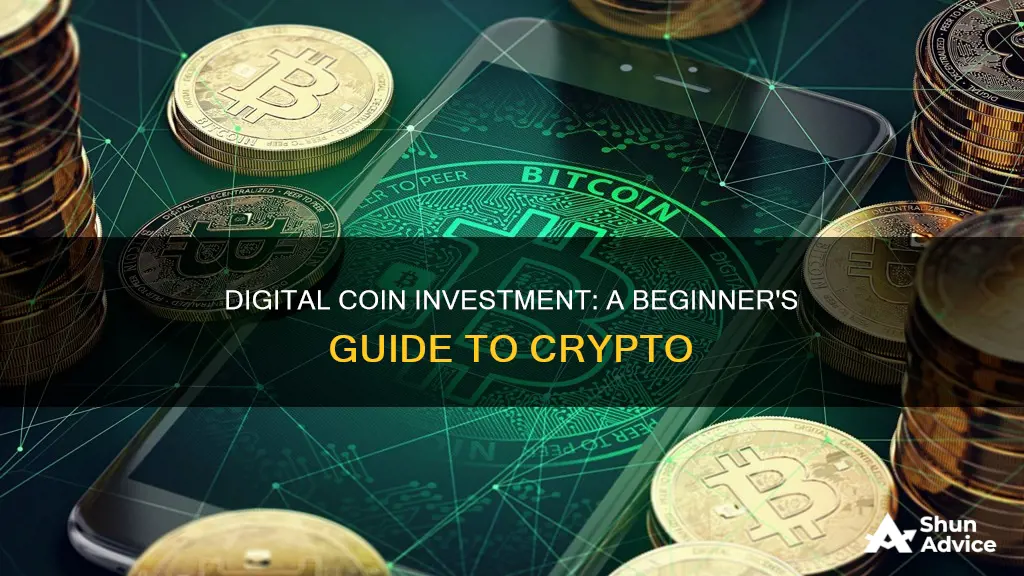
Investing in digital coins, or cryptocurrencies, is a risky endeavour that has the potential for big gains. Cryptocurrencies are digital currencies that are encrypted and often decentralised. Bitcoin, the first and most popular cryptocurrency, is based on blockchain technology, a permanent, decentralised ledger system.
There are thousands of cryptocurrencies available, and they can be bought on digital platforms like Coinbase and Robinhood, or on cryptocurrency exchanges like Coinbase, GDAx and Bitfinex.
Investing in cryptocurrencies is risky because they are incredibly volatile and are not backed by governments or precious metals like traditional currencies. However, they have the potential for large gains, as demonstrated by Bitcoin's performance over the years.
Before investing in digital coins, it is important to understand the risks and volatility of the market and decide if it aligns with your risk tolerance.
| Characteristics | Values |
|---|---|
| Definition | Digital currency that is encrypted and often decentralized |
| Examples | Bitcoin, Ethereum, Cardano, XRP, Solana, Dogecoin, Binance Coin, Tether, USD Coin, etc. |
| Volatility | High |
| Risk | High |
| Investment Approach | Long-term, Short-term, Speculation |
| Purchase Options | Crypto Exchanges, Crypto Wallets, Brokerage Firms, Crypto ATMs, etc. |
| Purchase Requirements | Debit Card, Fiat Currency, Altcoins, etc. |
| Storage Options | Software Wallets, Hardware Wallets |
What You'll Learn

How to choose a cryptocurrency to invest in
Understand the Market
The cryptocurrency market is saturated with new projects, many of which are solving problems that have already been solved by other cryptocurrencies. This means that there are a lot of undeserving projects getting funded. Buzz words win out over technology worthiness and many investors are average people looking to get rich, hoping to have success that cryptocurrencies like Ethereum, Neo and Bitcoin have had in the past. This results in scams being prevalent and investor caution being thrown out the window.
Look for Quality Projects
Quality projects often go under the radar for far longer than they should as the best investments get hidden behind rubbish that uses ICO money to advertise to the average investor through popular websites. Quality projects take their time to develop and master their niche, product and concept. These projects don't market until later in the project life cycle, when they know that their product is worthy of sharing with others.
End User's Knowledge
The end user is the final piece in the puzzle, they're the ones who will be utilising the application and the ones who truly matter. As an investor, choose applications that are perfect for the end audience. The applications that will win out will be those that have optimised their end service to be as simple as possible for their target market. The end user should not ever need to know what drives the application.
Longevity
When choosing your long-term investments, it's important to select projects that appear to have longevity in mind, not just with the product itself but those producing it. Ask yourself: will this service still be needed or used in several years? Is there a competing service that can easily outperform this project? And do the developers appear committed? If you can answer these questions with enough confidence, then you're on to something with potentially good risk to reward.
Seek Platforms, Not Features
A lot of cryptocurrency projects are simply feature-projects, not platform-projects. This is also why you see only 20 to 30 arguably "viable" cryptocurrency projects today, while the other 700+ are useless long-term investments. With coins like Bitcoin or Ethereum, with enormous momentum and backing, you can't afford to be cryptocurrency or project-based simply on a feature. Take Exodus, the multi-cryptocurrency wallet, as another example, this is a great platform-based project. It provides a real-life use case and is available and easy for the masses to operate.
Being a "Pass-Through" Currency
Many cryptocurrencies on the market today will face this problem over the long term, even if they provide real use cases. The problem with most cryptocurrencies is that, for your average person, there is little to no incentive to hold it. If you exchange goods or services for Bitcoin, they will quickly transfer that Bitcoin into fiat, and the Bitcoin will go to the exchange to be sold.
Market Capitalization
Market capitalization is the price per coin or token multiplied by the total amount of coins or tokens in circulation. In crypto, we often need to differentiate between “Current Market Cap” and “Fully Diluted Market Cap”. The first includes all coins or tokens that are available to date, while the second also includes all coins or tokens that are still locked but will get released in the future. If there is a huge difference between those two values, it is very likely that the price will fall in the future, as more tokens (supply) meet the market (demand).
Investing in Bitcoin: Is $2000 a Good Start?
You may want to see also

The risks of investing in digital coins
Digital coins, or cryptocurrencies, are virtual or digital assets purchased with real money and traded on blockchain technology. While they can be a lucrative investment, they are also incredibly volatile and come with a host of risks that potential investors should be aware of.
Firstly, cryptocurrencies are not regulated or insured like stocks or real money in banks. This means that if something goes wrong, such as a crypto exchange being hacked or shutting down, there is little recourse for investors to recover their funds. Cryptocurrencies are also extremely volatile, with their value fluctuating wildly in response to various factors, including rising inflation and rate-hiking cycles. This volatility can lead to significant losses for investors if the market takes a downturn.
Another risk to consider is the prevalence of scams and fraud in the cryptocurrency space. Crypto scammers often target young and minority investors through social media, promising high returns and wealth accumulation. Unsuspecting investors may end up opening an account on a fraudulent exchange, losing their money without receiving any cryptocurrency in return. Even legitimate exchanges may not have adequate security measures in place, leaving them vulnerable to hacks and cyberattacks.
Additionally, initial coin offerings (ICOs) for new cryptocurrencies come with their own set of risks. ICOs are far riskier than stock IPOs as they have fewer regulatory safeguards and anyone can participate, potentially leading to overeager investors taking on too much financial risk.
Lastly, cryptocurrencies are easy to lose. If an investor uses a smartphone wallet and loses their phone or misplaces their "key" (a long password), they may lose access to their cryptocurrency with no way to recover it.
In conclusion, while investing in digital coins can offer high returns, it is crucial to be aware of the significant risks involved. These include a lack of regulation and insurance, extreme volatility, scams and fraud, risky ICOs, and the ease of losing one's investment.
Get Started with Bitcoin Investing in Canada
You may want to see also

How to buy and sell digital coins
Digital coins, or cryptocurrency, can be bought and sold in a similar way to traditional assets, such as stocks or mutual funds. However, there are some unique characteristics to this type of investment.
Buying Digital Coins
Firstly, you need to decide which cryptocurrency to buy. The most well-known is Bitcoin, but other popular options include Ethereum and Dogecoin. You can buy these and other cryptocurrencies on a crypto exchange, such as Coinbase, Gemini, or Kraken.
Next, you need to decide how you will pay for the digital coins. Most exchanges allow purchases via debit and bank transfers, and some also accept credit cards. You can also pay with other crypto if you already own some.
Once you have chosen your payment method, you can place an order on the exchange. Always review the confirmation screen before finalizing your purchase.
Selling Digital Coins
Selling digital coins works in a similar way to buying them. You can sell via an exchange or directly to another person. You will need to transfer your cryptocurrency to the platform or person you are selling to, and then confirm the sale.
It is important to note that whenever you sell crypto for fiat money or trade it for other crypto, you will need to report cryptocurrency transactions for tax purposes.
Collectible Coins: A Smart Investment Move?
You may want to see also

How to store your digital coins
Storing your digital coins safely is paramount. Attackers are active in the digital currency space, targeting both companies and individuals. Here are some detailed instructions on how to store your digital coins securely:
Use a Reputable Exchange or Platform:
Consider using a well-known and trusted cryptocurrency exchange or platform, such as Coinbase, to store your digital coins. These platforms often have robust security measures in place to protect your assets. For example, Coinbase offers a range of security features, such as two-factor authentication and encrypted wallets.
Secure Your Credentials and Devices:
Protect your access credentials, such as passwords and private keys. Use strong, unique passwords for each account and consider using a password manager. Additionally, secure the devices you use to access your digital coins. Keep your operating system and applications up to date, avoid installing software from unknown sources, and use anti-virus software.
Utilize Cold Storage Options:
For long-term storage or if you're holding a significant amount of digital coins, consider using cold storage options such as hardware wallets. These wallets store your digital coins offline, providing an extra layer of security. Examples include Trezor and Ledger hardware wallets.
Diversify Your Storage Methods:
Don't put all your digital coins in one basket. Diversify your storage methods to reduce the risk of loss or theft. You can use a combination of hot wallets (online wallets) and cold wallets (offline wallets). For example, you might use an online wallet for a small portion of your digital coins that you use frequently and a hardware wallet for the bulk of your holdings.
Enable Additional Security Measures:
Take advantage of additional security features offered by exchanges or platforms. For instance, Coinbase offers a vault product that requires multiple approvals for withdrawals, adding an extra layer of security. You can also explore multi-signature transactions, which require multiple signatures for transactions, making it harder for attackers to access your funds.
Physical Security for Devices:
If you're using a hardware wallet or storing your digital coins on a dedicated device, ensure physical security for that device. Keep it in a safe place, and consider using a safe to protect it from theft or damage. Additionally, back up your hardware wallet to ensure you can recover your digital coins if the device is lost or damaged.
Regularly Review and Update Security Measures:
Stay vigilant and keep yourself updated with the latest security practices. Review and update your security measures regularly, including passwords, two-factor authentication methods, and device security. Stay informed about new types of attacks and adjust your security measures accordingly.
Consider a Third-Party Grading Company:
If you have highly valuable digital coins, consider sending them to a third-party grading company for encapsulation and grading. This option provides an additional layer of security and helps protect the integrity of your digital coins. However, this method may be costly, so consider if the expense is worth it for your specific coins.
Offline Storage in a Safe Location:
If you prefer offline storage, choose a safe location that is not obvious to potential burglars. Consider a hidden spot in your home, or opt for a safe deposit box at a bank. Ensure that the safe deposit box is not placed too close to the ground, as chemicals from carpet cleaning can potentially harm your storage devices over time.
Insurance and Regular Inspection:
For added peace of mind, consider insuring your digital coin collection through a reputable insurance provider. Additionally, regularly inspect and handle your stored digital coins to ensure their condition. Use clean devices or wear cotton gloves to avoid transferring oils or dirt onto your storage devices.
Remember, security is a continuous process, and it's crucial to stay vigilant and adapt your security measures as new threats emerge. By following these instructions, you can help protect your digital coins from various types of threats and ensure their long-term preservation.
Altcoin Investment: How Much is Sensible?
You may want to see also

How to make money with your digital coins
Investing in cryptocurrencies is a risky business, but there are several ways to make money with your digital coins. Here are some strategies to consider:
Long-term Holding
Buy cryptocurrencies and hold them over the long term, hoping that their value will increase over time. This strategy is based on the assumption that the demand for cryptocurrencies will continue to grow, leading to an increase in their value. For example, Bitcoin has seen tremendous growth since its inception, and many investors have benefited from its long-term gains.
Trading
Capitalize on the volatility of cryptocurrency prices by actively trading them. This involves monitoring price movements and making timely trades to profit from short-term fluctuations. Some traders spend a significant amount of time analyzing charts and market data to identify profitable trades. Others use "good 'til canceled" orders, which allow them to set a price limit and have the trade executed automatically once that price is reached.
Crypto Staking
Crypto staking is a way to earn passive income with certain cryptocurrencies, such as Ethereum and Cardano. By holding these coins in a wallet, you can participate in the validation of transactions on the blockchain and earn rewards. The concept is similar to collecting dividends from stocks, but the yields vary depending on the type of crypto. Less risky cryptos like Ethereum tend to offer lower yields, while altcoins like Cardano, Solana, and Dogecoin can provide higher returns.
Diversification
Diversifying your crypto portfolio can be a way to manage risk and maximize returns. With thousands of cryptocurrencies available, investors can spread their investments across multiple coins to reduce the impact of any single coin's performance. Diversification can also provide exposure to different sectors within the crypto space, such as decentralized finance (DeFi) and non-fungible tokens (NFTs).
Altcoin Speculation
Some investors focus on buying and selling more obscure cryptocurrencies, known as altcoins, in an attempt to get in early on the next big thing. This strategy involves a high level of risk and speculation, as the success of these coins is uncertain. However, the potential payoff can be significant if you identify an altcoin that gains widespread adoption or solves a specific problem in the crypto ecosystem.
Remember, investing in cryptocurrencies is a highly speculative endeavour, and it's crucial to understand the risks involved before committing any capital. The value of cryptocurrencies is extremely volatile, and there is no guarantee that they will retain their value in the long term. Always do your own research and invest only what you can afford to lose.
Why Bitcoin Belongs in Your Investment Portfolio
You may want to see also
Frequently asked questions
Cryptocurrency is a highly volatile and speculative investment. The value of a digital coin depends on how others perceive it, and it can fluctuate wildly in response to market sentiment.
Cryptocurrencies are decentralised, meaning they are not controlled by central banks or governments. This gives them several advantages over fiat currencies, including increased security and transparency. Additionally, cryptocurrencies have produced top returns for investors over time.
It can be helpful to start with a commonly traded and relatively well-established coin, such as Bitcoin or Ethereum. However, it's important to do your research and understand the specific technological product that a coin is linked to.







